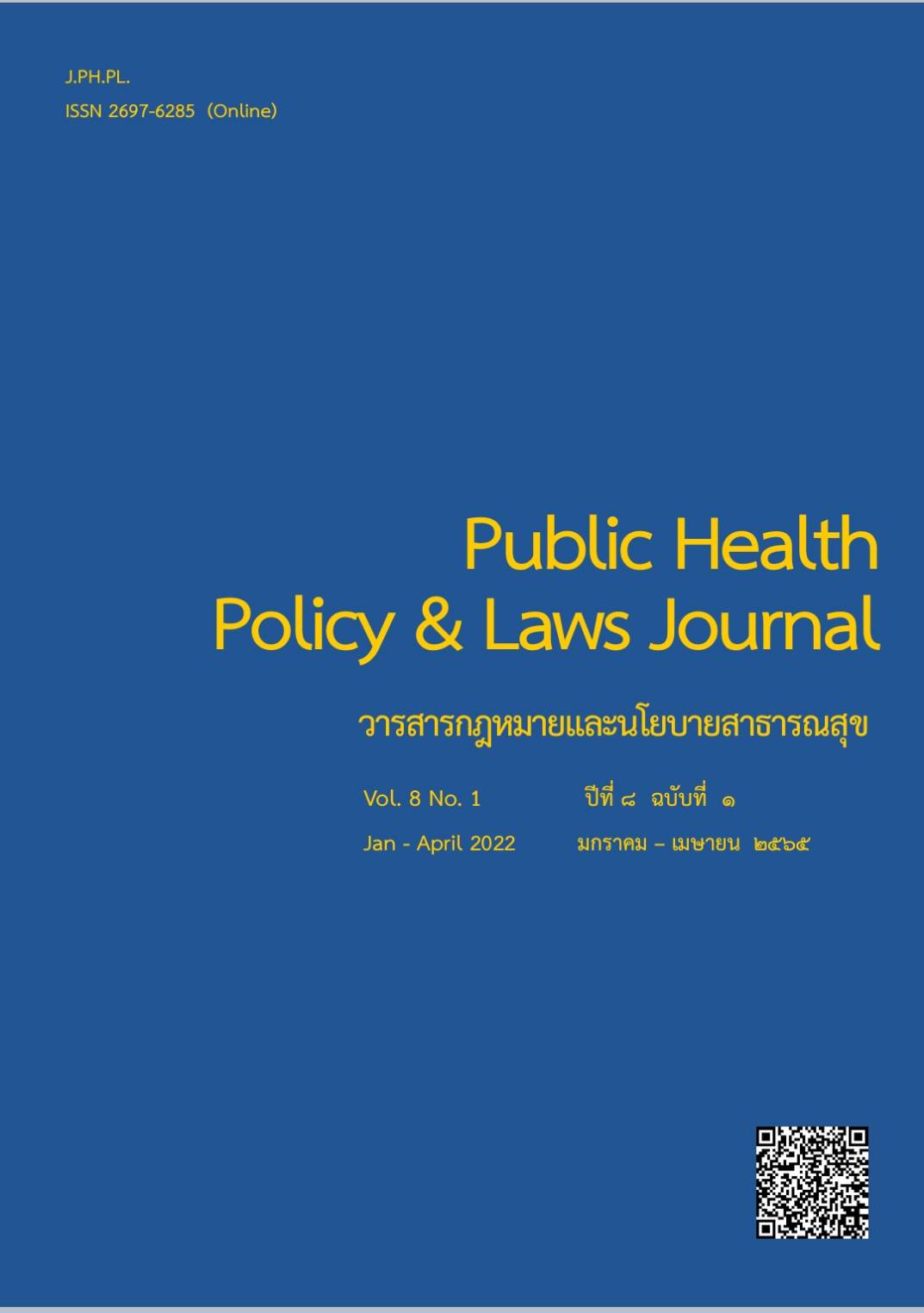Effects of Self-care Behavioral Modification Program among Elderly Population with High Risk for Non-communicable Diseases of Phranakhon Si Ayutthaya Province
Keywords:
Elder, Behavioral modification program, Self-efficacy theory, Non-communicable diseases (NCDs)Abstract
This is a quasi-experimental study to investigating the effect of self-care behavioral modification program among elderly population with high risk for non-communicable diseases (NCDs). Self-efficacy theory was applied to this program. The 84 subjects were divided to two groups, experimental and control groups. Experimental group participated in behavioral modification program for 10 weeks. The program included activities such as health education, experience sharing, model demonstration, role playing, and group discussion. The questionnaire was used for collecting data, before and after a training program. The statistical analysis was performed by Chi-square test, Wilcoxon signed-rank test, and Mann-whitney U test.
Results showed that mean scores for self-care knowledge, perceived self-efficacy, outcome perception and self-care behavior in experimental group, increased significant statistically, compared with control group (p-value < 0.001).
This study demonstrated that the applied self-efficacy theory program was influential in changing of self-care behavior in elderly population. Hence, health-related organization should apply this program for self-care behavioral modification among elderly population, who are at risk of NCDs.
References
กรฐณธัช ปัญญาใส, จุฑามาศ กิติศรี และพิชชานาถ เงินดี. (2560). ประสิทธิผลของโปรแกรมการสร้างเสริมสุขภาพเพื่อการพัฒนาคุณภาพชีวิตบนพื้นฐานความต้องการของผู้สูงอายุ. วารสารสาธารณสุขมหาวิทยาลัยบูรพา, 12(2), 65-74.
กลุ่มงานเวชปฏิบัติครอบครัวและชุมชน. (2562). รายงานการดำเนินงานคลินิกโรคเรื้อรัง โรงพยาบาลบางบาลประจำปีงบประมาณ 2562 : โรงพยาบาลบางบาล จังหวัดพระนครศรีอยุธยา.
เจิมศักดิ์ ปิ่นทอง. (2558). การปฏิรูประบบรองรับสังคมสูงวัย. กรุงเทพฯ : โอเดียนสโตร์.
ชมัยพร วรรณปักษ์. (2561). ผลของโปรแกรมส่งเสริมพฤติกรรมสุขภาพของผู้สูงอายุในหมู่บ้านโคกสะอาด ตำบลสีคิ้ว อำเภอสีคิ้ว จังหวัดนครราชสีมา. วารสารส่งเสริมสุขภาพและอนามัยสิ่งแวดล้อม, 12(7), 82-97.
ณภัสวรรณ ธนาพงษ์อนันท์, ประสานศิลป์ คำโฮง และวรพล แวงนอก. (2562). ประสิทธิผลของโปรแกรมการประยุกต์ใช้ทฤษฎีความสามารถตนเองที่มีต่อพฤติกรรมการส่งเสริมการออกกำลังกายของผู้สูงอายุ อำเภอบรบือ จังหวัดมหาสารคาม. วารสารสาธารณสุขมหาวิทยาลัยบูรพา, 14(1), 106-118.
ปาณิสรา ส่งวัฒนายุทธ, กมลพรรณ วัฒนากร, ขวัญตา กลิ่นหอม และพัชรนันท์ รัตนภาค. (2559). ผลของโปรแกรมการมีส่วนร่วมของครอบครัวและอาสาสมัครสาธารณสุขประจำหมู่บ้านต่อพฤติกรรมส่งเสริมสุขภาพและความดันโลหิตของกลุ่มเสี่ยงความดันโลหิตสูง. Veridian E-Journal, Science and Technology Silpakorn University, 3(3), 1-14.
ปราโมทย์ ประสาทกุล. (2559). สถานการณ์ผู้สูงอายุไทย พ.ศ. 2558. กรุงเทพฯ : บริษัทอัมรินทร์พริ้นติ้งแอนด์พับลิชชิ่ง จำกัด(มหาชน).
ภาสิต ศิริเทศ และ ณพวิทย์ ธรรมสีหา. (2562). ทฤษฎีการรับรู้ความสามารถของตนเองกับพฤติกรรมการดูแลสุขภาพของผู้สูงอายุ. วารสารพยาบาลทหารบก, 20(2), 58-65.
มูลนิธิสถาบันวิจัยและพัฒนาผู้สูงอายุไทย. (2557). รายงานสถานการณ์ผู้สูงอายุไทย พ.ศ. 2556. กรุงเทพฯ : มูลนิธิสถาบันวิจัยและพัฒนาผู้สูงอายุไทย.
วิมล บ้านพวน. (2558). คู่มือแนวทางการฝึกอบรม หลักสูตร Care manager. (พิมพ์ครั้งที่ 2). กรุงเทพฯ : ศูนย์ สื่อและสิ่งพิมพ์แก้วเจ้าจอม มหาวิทยาลัยราชภัฎสวนสุนันทา.
สำนักงานสถิติแห่งชาติ. (2559). Thai elderly, Bangkok: Department of Statistical Data and Information.
อรวรรณ น้อยวัฒน์ และอารยา ประเสริฐชัย. (2558). ผลของโปรแกรมส่งเสริมสุขภาพต่อพฤติกรรมสุขภาพ ในกลุ่มผู้สูงอายุจังหวัดนนทบุรี. วารสารราชพฤกษ์, 13(1), 36-45.
Bandura,A. (1997). Social Learning Theory. New Jersey. Prentice-Hall Inc
Han SS et al. (2005). The effects of a health promotion program for elderly. Taehan Kanho Hakhoe Chi.2005 Oct, 35(6), 1054-62
Harvey IS and Alexander K. (2012). Perceived Social Support and Preventive Health Behavioral Outcomes among Older Women. J Cross Cult Gerontol, 27(3), 275–290.
Ronald, C. P. & Nick, H. (2007). Predicting low-fat diet intentions and behaviors for the prevention of coronary heart disease: An application of protection motivation theory among an Australian population. Psychology & Health Journal, 10(5), 397-408.
Downloads
Published
How to Cite
Issue
Section
License
Disclaimer and Copyright Notice
The content and information presented in articles published in the Journal of Law and Public Health Policy represent the opinions and sole responsibility of the respective authors. The editorial board does not necessarily agree with or assume any responsibility for the views expressed.
All articles, data, content, images, and other materials published in the Journal of Law and Public Health Policy are the intellectual property of the journal. Any individual or organization wishing to reproduce, distribute, or otherwise use the entirety or any part of such materials must provide proper citation.





